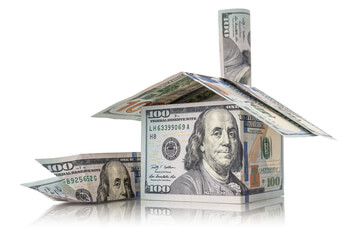 If the number on line item number 37 of your federal 1040 tax return "Amount You Owe" gives you heart palpitations, don't despair. The Internal Revenue Service (IRS) may be willing to work with you as long as you stay in contact and take the necessary steps to get your tax bill paid.
If the number on line item number 37 of your federal 1040 tax return "Amount You Owe" gives you heart palpitations, don't despair. The Internal Revenue Service (IRS) may be willing to work with you as long as you stay in contact and take the necessary steps to get your tax bill paid.
What are the steps you can take to pay the IRS if you don't have cash readily available? The best answer for taxpayers in this situation who own homes may come as a surprise: They should consider a home equity loan or line of credit (HELOC) to pay taxes due..
Avoid tax penalties
Even if you don't know exactly how you'll pay off your tax debt, you should still be sure to file on time. Not filing on time can be costly. For example, the penalty for failure to five is 5% of the taxes due each month, capping out at 25% of the amount you owe, while the penalty for failing to pay the taxes you owe on time is 0.5% of the unpaid taxes for each month or part of a month the tax remains unpaid. This penalty won’t exceed 25% of your unpaid taxes.
While the bad news is that these can and will both be charged at the same time , the somewhat better news is that when they are charged together, the failure to file penalty is reduced by the amount of the failure to pay penalty. For example, instead of a 5% failure to file penalty for the month, the IRS would change you a 4.5% failure to file penalty and a 0.5% failure to pay penalty.
The lower you wait, the worse it gets, since interest also accrues on the unpaid balance and compounds daily from the due date of the return. As of this writing, the annual interest rate you would be charged is 7%, but it varies each quarter.
Still, there's probably no reason for you to have to pay any additional fees or penalties, since at least four options are available to you for paying outstanding tax obligations, each has advantages and drawbacks.
IRS installment payment plan
The IRS offers payment plans. You can request an installment payment plan for your tax debt by proposing a monthly payment amount to the IRS. In a perfect world, you'll be able to agree to a monthly amount that's acceptable to the IRS, as well as one within your budget.
As with most other repayment options, there are downsides to an IRS installment plan. For example, there's a setup fee charged for installment agreements. IRS installment plan fees vary and depend on how you set up the account and how you intend to make payments, and range from $43 to $225.
Use a home equity loan to pay taxes
You may be surprised if you are wondering, "Can you use a home equity loan to pay taxes?" Getting a loan to pay off the IRS may sound unappealing, but the IRS advises that one of the best solutions for paying off tax debt is a home equity loan. They state this in IRS Topic 202: "You should consider financing the full payment of your tax liability through loans, such as a home equity loan from a financial institution. The interest rate and any applicable fees charged by a bank or credit card company may be lower than the combination of interest and penalties set by the Internal Revenue Code."
Since the Tax Cuts and Jobs Act back in 2017, you can no longer deduct the interest on home equity debt unless the funds are used to "buy, build or substantially improve" a qualified residence. Since paying your tax bill isn't one of those, you'll only be able to enjoy easy access to relatively low-cost funds, as there's no longer any additional tax benefit for using your home equity to pay your tax bill or nearly anything else.
Fees for setting up a home equity line of credit can be minimal, usually only including costs for a credit check and an appraisal of your home. If you have good credit and some equity in your home, you may be able to get a home equity line of credit (HELOC) at an affordable interest rate. Typical home equity pricing starts at about the Prime Rate plus two percentage points, but can be higher or lower depending on your credit, debt-to-income ratio, how much equity you are borrowing and other factors. Some lenders will allow you to establish a line of credit, then convert funds you've drawn into a fixed-rate, fixed repayment term option if you prefer one.
Terms for home equity loans and lines of credit can last as long as 20 years. HELOCs may also only require payments of interest for up to the first 10 years of the line, which may afford you some financial flexibility for a time.
Getting a home equity loan may result in lower payments than the IRS can offer in an installment plan. Review our comprehensive guide to home equity loans and lines of credit to fully understand how they work.
Related: Paying tax debt with home equity? Shop home equity lenders, rates and offers
Getting a personal loan to pay off the IRS
You may be able to get a personal loan for paying your tax debt. Personal loans to pay taxes off are generally obtained from a private lender, a bank or a credit union.
Most often, personal loans have relatively short terms, usually up to about five years or so. A short term means lower total interest payments but higher monthly payments. If the amount you need to borrow to cover your tax bill is substantial, the monthly payments may be unaffordable, or you may not be able to qualify to borrow enough to fully pay off your tax bill.
Personal loans are usually unsecured, and the interest rate you'll be charged will depend upon your credit, DTI ratio and amount you're borrowing. Interest rates being charged for personal loans may be less than or even nearly as high as credit card rates. These are typically fixed-rate installment loans, so you can usually the total interest cost you'll be charged at the outset. You'll need to check with the lender's policies, but personal loans may come without any prepayment penalties. This could mean no additional cost if you're able to pay off your loan early to save on interest.
Pay the IRS bill with a credit card
Although you can't use a credit card when it comes to a downpayment on a new home, the IRS accepts all major credit card payments for taxes owed. One possible advantage is that if you use a rewards credit card, paying your taxes may earn rewards such as cash back or travel bonuses.
You get to choose from three processing firms the IRS uses to handle paying your taxes by credit card, debit card or digital payment service (PayPal, Venmo, etc.).
The catch to using a credit card is that the IRS charges you a processing or "convenience" fee. Another concern is that if you are unable to pay off the credit card balance quickly, you may end up paying higher total interest than in other loans to pay off your taxes. The expected time frame for paying off your credit card and the associated interest charges must be factored into whether or not using a card is a reasonable option. There are also limits to how often you can use a credit card to make tax payments, too.
Paying off your IRS tax debt
Owing money to the IRS can be intimidating and scary. Fortunately, you have options to resolve the issue with some planning. If IRS installment payments are uncomfortably high, and you have some equity in your home, using a home equity loan or home equity line of credit to pay your taxes may be a good option. Personal loans can also be considered, and credit cards might be used as a last resort.
Whichever option you choose, be sure to address the problem promptly. The IRS isn't likely to just go away, and neither is your tax obligation. In fact, ignoring the issue can make it more likely the IRS will slap a lien on your home -- a public record that can damage your credit. You may not be able to refinance your home loan or sell your property or without first clearing this obligation.
If you do set up a home equity line of credit to pay this year's tax liability, the good news is that you'll have it in place should you need it again next year.
This article was updated by Keith Gumbinger and Craig Berry.




This article is misleading as in fact, you CANNOT deduct interest on a HELOC if used to pay taxes.
The article didn't specifically say that you could deduct the interest when a home equity product was used to pay your tax bill, but apologies for the lack of clarity. We have modified the content.